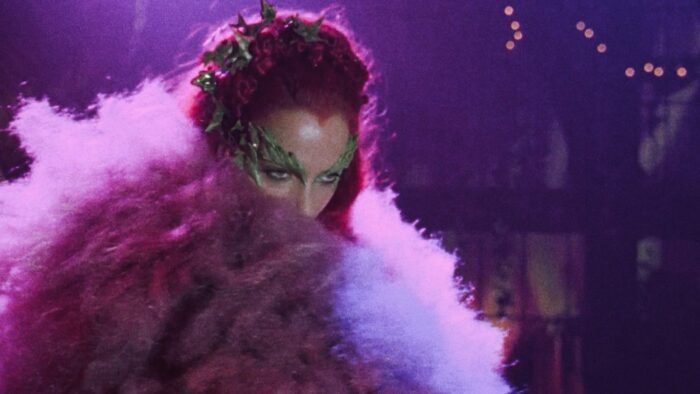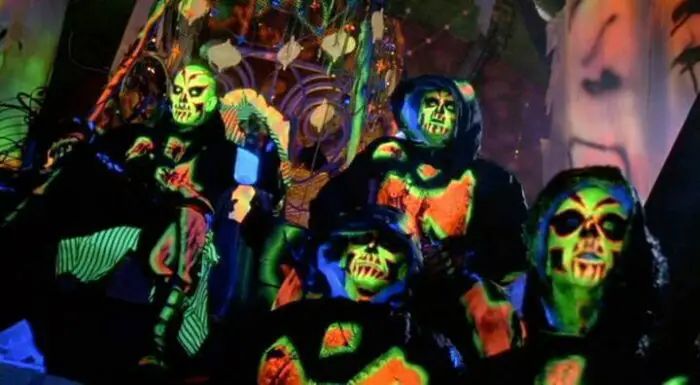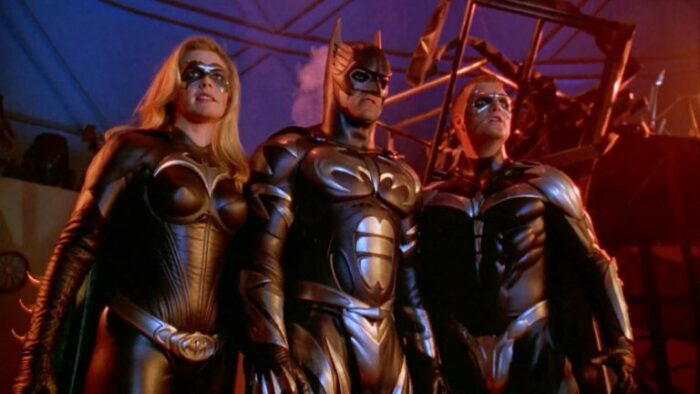If ever there was a year that could be called the year of the summer blockbuster, it would almost certainly have to be 1997. Not only was it the year of Men In Black, Jurassic Park: The Lost World, and Air Force One, it was also the mainstream peak of arguably the wildest career any actor has ever had, as Nicolas Cage would gift us with both Con Air and Face/Off. Not only were these films smash hits in financial terms, but they were also well-crafted pieces of cinema that in most cases are still enjoyed to this day. Also released that summer was perhaps one of the most infamous films ever made: Joel Schumacher’s Batman & Robin.
Being all of about four years old in the summer of 1997, Batman & Robin was a film I wouldn’t see for myself until much later on in life. But it was one that I inevitably heard about, usually in a way that almost felt like I was hearing about an urban legend: a film of almost mythical levels of awfulness, one that made a superhero whose name practically meant “cool” into a laughingstock and turned a fairly successful film franchise into the Hollywood equivalent of radioactive waste. So when I first took the plunge and saw Batman & Robin somewhere in the ballpark of five years ago, I was prepared for the worst.
And… I honestly loved every minute of it. Mind you, I was doubled over with laughter pretty much the whole time, but there was hardly a moment where I wasn’t thoroughly entertained. Yes, by virtually every metric Batman & Robin is an awful film. It’s the film that topped Empire’s reader-voted list of “50 Worst Films Ever Made“. It’s a film one of our own writers called “one of the worst, perhaps the worst, blockbuster of the ’90s.” It’s a film that Joel Schumacher has flat-out apologized for making.
But, it’s also a film that dares to not only say that there might be something a little absurd about a rich guy who spends his nights dressing up as a bat to fight criminals, but that the absurdity is something that should be fully embraced and celebrated. It’s an utterly ridiculous film that wears its ridiculousness like a badge of honor. And finally, it’s a film that in 2022 is a bizarrely refreshing antidote to modern superhero films, as the genre feels increasingly weighed down by the need to try and establish itself as more serious fare.

Batman Forever found Joel Schumacher blending the campy tone of ’60s Batman with the gothic grandeur of ’80s Batman, drenching the whole thing in neon and letting Tommy Lee Jones and Jim Carrey loose to see who could chew the most scenery. Batman & Robin is that same formula being twisted into full-blown insanity. When you get to about a quarter of the way into the film to see Uma Thurman performing a burlesque dance while sensually removing a gorilla costume, then about five minutes later find Batman and Robin in the middle of a bidding war for her affections capped off by Batman pulling out a themed credit card from his utility belt and quipping “never leave the cave without it,” you realize that we haven’t just jumped the shark, we’ve jumped the exploding shark that Adam West barely escaped in the ’60s with the help of his trusty Shark Repellent Bat-Spray—seriously, ’60s Batman is a genuine masterpiece, and if you haven’t already watched it you’re doing yourself a disservice.
The film feels like a constant game of escalation, continually topping itself in terms of sheer audacity and ridiculousness: we go from Robin crashing through a museum door on his motorcycle and leaving behind a perfect silhouette of the Robin symbol to Mr. Freeze freezing a dinosaur skeleton and shouting “What killed the dinosaurs? The Ice Age!” to Batman and Robin midair surfing on doors broken off of a space capsule to somehow survive a thirty thousand foot drop in about a five-minute timespan. The characters—well, more like caricatures—are equally ridiculous, from George Clooney’s Batman—the third actor to take on the role in the same franchise and same continuity—to Uma Thurman’s “Mae West but somehow more provocative” take on Poison Ivy to a version of Bane that’s basically Frankenstein’s monster in a luchador mask, and the Gotham City they all inhabit feels more like a funhouse than an actual city. Roads zigzag across each other miles above the ground, giant statues seemingly adorn every building, and the ground level appears to be overrun by metrosexual biker gangs. It’s not so much tonal whiplash as much as it is an onslaught on any part of your brain trying to logically process what you’re seeing, all you can do is hope to hang on from one moment to the next.
Meanwhile, one finds oneself asking questions throughout the film: how is Alfred—who is apparently dying—able to not only record a message for Barbara in anticipation of her finding the Batcave, but also make her a perfectly fitted Batgirl costume? Why did Mr. Freeze decide his gang’s aesthetic would be “post-apocalyptic Mad Max style biker gang on ice skates with Slipknot masks and skull codpieces”? Did Batman, in full costume, go down to the Bank of Gotham to apply for his credit card? None of these questions are ever explored, leaving one with an almost existential sense of awe and horror at just how deep the rabbit hole of absurdity goes.

Watching Batman & Robin today, twenty-five years after its release, it’s more than understandable why this is the film that killed off the Batman film franchise for close to ten years. The character was well into the dark, serious phase of his existence, ignited by both Frank Miller’s The Dark Knight Returns and the first two Batman films, and between Arnold Schwarzenegger’s increasingly awful puns and the infamously prominent nipples on the Batsuit, Batman & Robin is a film that at times feels like it’s mocking you for trying to take anything about it seriously.
So why do I love this film? Part of it is certainly a matter of taste—I am certainly someone who has been known to savor an objectively bad film from time to time. Part of it is a matter of expectation—after hearing about how bad it was for so long, it was a film I approached in the mindset of not taking any of it seriously and embracing the badness of it all.
But, part of it is almost certainly that I’m getting a little exhausted with the current state of superhero movies, which currently feel like they’re in a late teens/early twenties “we demand to be taken seriously” phase. The current batch of post Infinity War/Endgame MCU films feels particularly guilty of this: fun seems to be falling by the wayside in favor of stories centered around its heroes trying to deal with the aftermath of mass trauma, films are starting to border on overstuffed as multi-hero crossovers become the norm instead of a novelty, and most egregious of all, every film has an inescapable feel of being part of an installment plan of sorts, demanding that you invest your future money and time to see what comes next or how it fits into the bigger picture that might not take shape until years down the line. It’s to the point that films are being retroactively made part of cinematic universes—Michael Keaton’s version of Batman is set to return in the upcoming Flash movie as part of a “multiversal adventure” to integrate his version of the character into the DC Extended Universe.
Don’t get me wrong—I still absolutely love the MCU and its films, Dr. Strange in the Multiverse of Madness in particular is one of the best movies I’ve seen all year. But I can’t deny how refreshing it feels to watch a film that doesn’t feel like it wants anything more out of me beyond enjoying it. There’s no TV series I have to watch to know what’s going on, and while it does end with a typical “the Dynamic Trio is off to more adventures!” shot, there’s no lingering sense of “wait five years to see how everything comes together it’ll be super cool we promise!”

As for Batman, there’s an argument to be made that out of those first four films, Batman & Robin is the one that continues to have the most influence on cinematic incarnations of Batman, in an entirely negative sense: every single version of Batman on film has grown increasingly darker and more quote, “realistic” in an attempt to distance themselves from any chance of approaching Batman & Robin‘s campy tone—in particular, the Bale-led trilogy seemed to go well out of its way to spend time giving technical explanations for all of its gadgets to try and feel more grounded. Again, I still absolutely enjoyed those films—The Batman in particular is another personal favorite of mine. But there’s more than a little bit of truth to what was noted in one review of the film: that it felt like somewhere along the line, someone decided that Batman movies should no longer be fun.
Batman & Robin captures something that feels increasingly lost in modern superhero films: a sense of escapism, of creating a world with only a passing resemblance to our own that can completely take you away from reality for an hour and a half. Sometimes—perhaps selfishly—I don’t want a superhero film to be about trying to deal with the trauma of a massive, cataclysmic event when everyone I know is trying to deal with the trauma of a real-life massive, cataclysmic event.
Batman & Robin is certainly what most people would consider to be a bad movie. But what a gloriously bad movie it is. It’s not simply a bad superhero movie: it’s the best bad superhero movie ever made. It’s the genre’s equivalent of The Rocky Horror Picture Show—both a masterpiece of camp and a celebration of the inherent absurdity found in its source material. It’s also a film that feels more and more like a relic of a bygone era. While I’m hoping that Thor: Love & Thunder is the start of the MCU starting to move on from the lingering trauma of Infinity War/Endgame‘s events, future Batman films are almost certainly going to stay firmly in the realm of the grim, dark and intense. I don’t ask that anyone else love or even necessarily enjoy Batman & Robin, but if you let go of your expectations and appreciate it for what it is—an hour and a half of cheesy, campy, clinically insane fun—then who knows: you just might find it to be more entertaining than you remember.




If you enjoy Batman & Robin, I highly recommend watching Joel Schumacher’s director commentary that is featured on most dvd/blu-ray releases of the film. He has a really fun time joking around about the making of the film and it’s one of the rare commentary tracks I’ll throw on every once and a while, or turn friends on to it, because it is hilarious. “Sometimes as a director you get to blow things up… in this movie I blew up a dinosaur”.
I think you’ll get a kick out of it 🙂